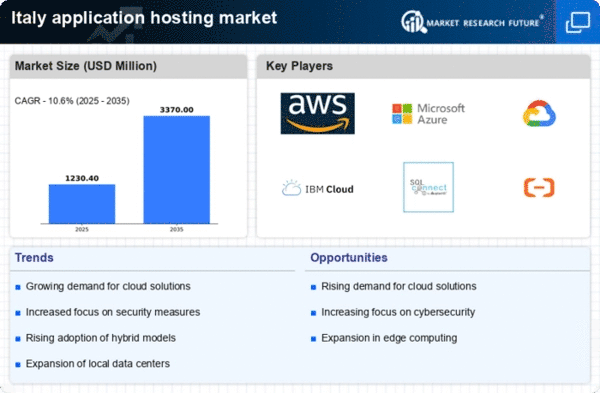Rise of E-commerce Platforms
The application hosting market in Italy is significantly influenced by the rapid expansion of e-commerce platforms. With online shopping becoming a preferred choice for consumers, businesses are compelled to establish a strong online presence. Recent statistics indicate that e-commerce sales in Italy have grown by over 20% in the past year, prompting retailers to seek reliable application hosting solutions. This growth necessitates hosting services that can handle high traffic volumes and ensure seamless user experiences. Consequently, the application hosting market is poised for growth as companies invest in scalable hosting solutions that can accommodate the increasing demands of e-commerce operations, thereby enhancing their market competitiveness.
Adoption of Remote Work Solutions
The application hosting market in Italy is witnessing a transformation due to the widespread adoption of remote work solutions. As organizations embrace flexible work arrangements, there is an increasing reliance on cloud-based applications and hosting services that facilitate remote collaboration. Recent surveys indicate that over 50% of Italian companies have implemented remote work policies, which necessitate reliable application hosting to support virtual operations. This shift is likely to drive demand for hosting solutions that offer high availability and performance, as businesses seek to ensure uninterrupted access to applications for their remote workforce. Consequently, the application hosting market is expected to grow as companies prioritize hosting services that enhance productivity and collaboration in a remote work environment.
Emergence of Innovative Technologies
The application hosting market in Italy is being propelled by the emergence of innovative technologies such as artificial intelligence (AI) and machine learning (ML). These technologies are increasingly being integrated into application hosting services, enabling businesses to leverage advanced analytics and automation. As organizations seek to enhance their operational capabilities, the demand for hosting solutions that incorporate AI and ML functionalities is on the rise. It is projected that the application hosting market will see a significant uptick in investments aimed at adopting these technologies, as companies recognize the potential for improved efficiency and decision-making. This trend suggests a shift towards more intelligent hosting solutions that can adapt to the evolving needs of businesses in Italy.
Growing Demand for Digital Transformation
The application hosting market in Italy is experiencing a notable surge in demand driven by the ongoing digital transformation across various sectors. Businesses are increasingly recognizing the necessity of adopting digital solutions to enhance operational efficiency and customer engagement. According to recent data, approximately 70% of Italian companies are investing in digital technologies, which in turn fuels the need for robust application hosting services. This trend is particularly evident in industries such as retail and finance, where the integration of digital platforms is paramount. As organizations strive to remain competitive, the application hosting market is likely to benefit from this growing emphasis on digitalization, leading to increased investments in hosting solutions that support scalability and flexibility.
Increased Focus on Data Privacy Regulations
The application hosting market in Italy is also shaped by the heightened focus on data privacy regulations, particularly in light of the General Data Protection Regulation (GDPR). As organizations strive to comply with stringent data protection laws, there is a growing demand for hosting services that prioritize security and compliance. This regulatory landscape compels businesses to invest in application hosting solutions that offer robust security features and data management capabilities. It is estimated that around 60% of Italian companies are actively seeking hosting providers that can ensure compliance with GDPR, thereby driving growth in the application hosting market. This trend underscores the importance of security in hosting services, as businesses aim to protect sensitive customer data.
















